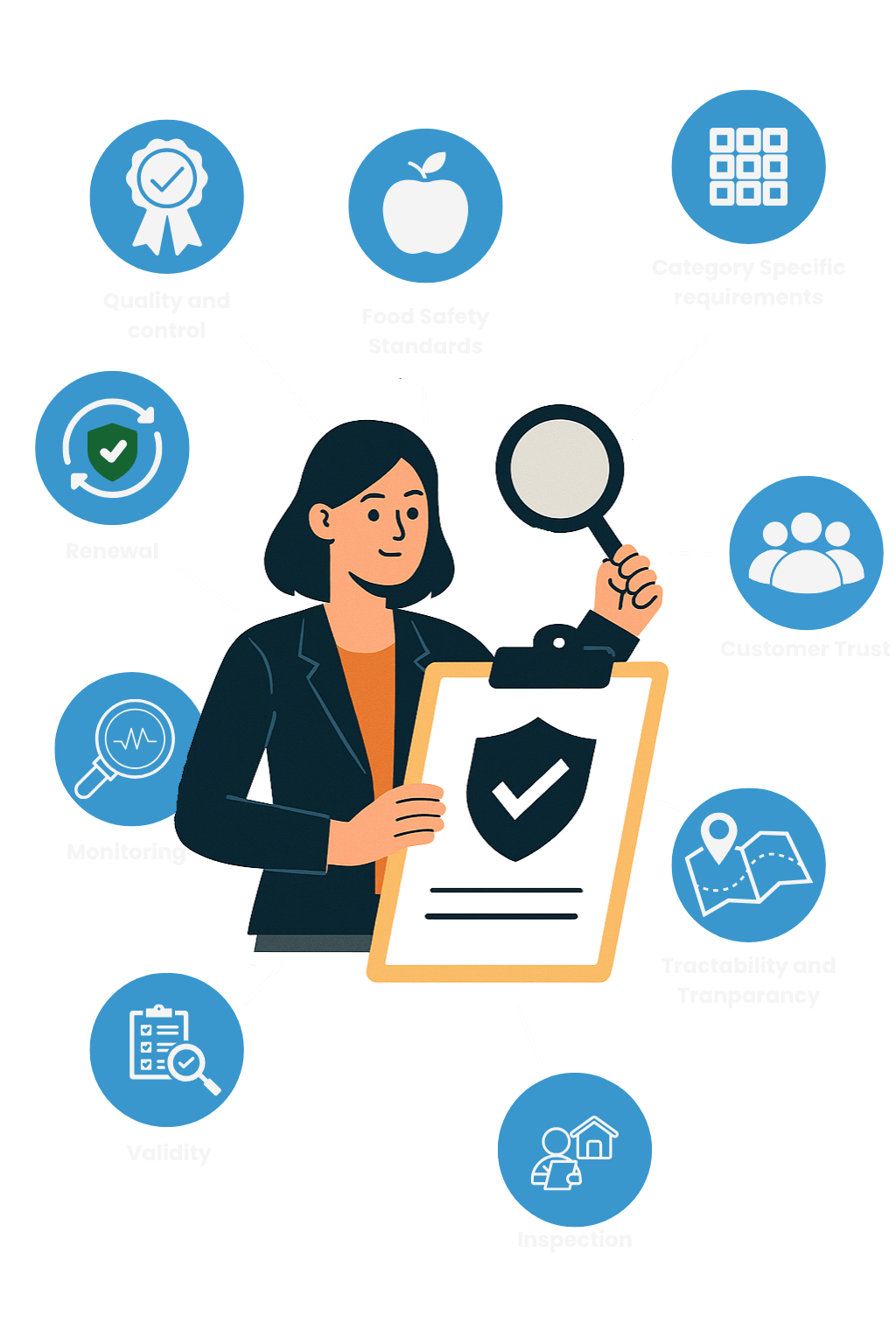FSSAI |
Troubled by the time-consuming FSSAI registration process? Taxamicus ensure quick approval for FSSAI license in India!
- Successfully processed 10,000+ FSSAI food licenses
- Receive guidance from our FSSAI License consultants

4270+
Happy Clients

99.2%
Filing Accuracy

14+ yrs
Of Experience

Free Consultancy By Expert
FSSAI License and Registration in India – An Overview
In India, obtaining an FSSAI License or Registration is a legal requirement for all businesses involved in the manufacturing, processing, storage, distribution, or sale of food products. The Food Safety and Standards Authority of India (FSSAI) ensures that food businesses comply with safety and hygiene standards, protecting public health. Depending on the scale and nature of operations, businesses must apply for either Basic Registration, State License, or Central License. Having an FSSAI License not only enhances the credibility of your brand but also increases consumer confidence and opens new opportunities for business growth. Understanding the correct category of registration is crucial to operate legally and avoid heavy penalties or business interruptions.

Who are Food Business Operator (FBOs)?
Food Business Operators (FBOs) are individuals or entities responsible for ensuring that the food they produce, process, distribute, store, or sell meets the required quality and safety standards. In India, any business or person involved in any stage of the food supply chain — from manufacturing to serving — is considered an FBO. This includes restaurants, food manufacturers, retailers, importers, exporters, transporters, storage units, home-based kitchens, and even food stalls.
Under the FSSAI regulations, all FBOs must obtain the necessary FSSAI License or Registration based on the size and type of their business operations.
FSSAI License Benefits.
Legal Compliance
An FSSAI License is mandatory under Indian law for any food-related business. Operating without it can lead to heavy penalties, closure of business, and legal action. Obtaining the license ensures you run your business lawfully without interruptions.
Builds Consumer Trust
An FSSAI License signals that your food products meet national safety and hygiene standards. Customers are more likely to trust and choose businesses that are licensed, helping you build a strong and loyal customer base.
Boosts Brand Reputation
Displaying an FSSAI License on your packaging, marketing materials, or premises enhances your brand’s credibility. It differentiates your business from unlicensed competitors and positions your brand as safe, reliable, and professional.
Expands Buss. Opportunities
With an FSSAI License, you can easily expand into new markets, supply to bigger retailers, partner with online platforms, or export your products. Many large buyers and platforms require food businesses to be licensed before collaboration.
Ensures Food Safety Standards
FSSAI regulations help you maintain proper hygiene, food handling, and quality controls. Following these standards not only protects consumers but also reduces risks like contamination, recalls, and foodborne illnesses, saving your business from reputational damage.

Eligibility Criteria for FSSAI License in India
To legally operate a food business in India, an FSSAI Registration or License is mandatory.
Eligibility depends on multiple factors like turnover, production capacity, area of operation, and business type:
- Annual Turnover: State License – ₹12 lakh to ₹20 crore | Central License – Above ₹20 crore
- Production Capacity: State License – Up to 2MT/day (food), 50,000L/day (dairy) | Central License – Over 2MT/day (food), 50,000L+/day (dairy)
- Business Type: State License – Single state operations | Central License – E-commerce, import-export, multi-state operations
- Area of Operation: State License – Within a single state | Central License – Across multiple states
- Storage Capacity: State License – Up to 50,000 metric tons | Central License – Above 50,000 metric tons
Who Needs a FSSAI License?
This includes:
Food Manufacturers
Home kitchens and large units producing food for sale
Food Retailers
Shops like grocery stores, supermarkets, bakeries, etc.
Restaurants and cafes
Hotes, restaurants, cloud kitchens, and canteens serving food.
Food Traders and Wholesalers
Suppliers selling food to retailers, restaurants, or consumers.
Distributors and Suppliers
Businesses transporting or storing food products.
Online Food Businesses
Selling food through websites, apps, Zomato, Swiggy, Amazon, etc.
Importers and Exporters
Businesses dealing with food imports and exports.
Food Packaging and Storage Units
Units packing, bottling, or storing food items.

Documents Required for FSSAI License and Registration -
Photo ID Proof
(PAN Card, Aadhaar Card, or Voter ID of the owner/authorized signatory)
Passport Size Photograph
(Recent photograph of the applicant)
Business Address Proof
(Electricity Bill, Rent Agreement, or Property Documents)
Business Registration Certificate
Partnership Deed, Incorporation Certificate, Shop & Establishment Certificate, etc.)
List of Food Products
(Items the business will manufacture, store, distribute, or sell)
Food Safety Management System (FSMS) Plan
(Basic FSMS declaration or a detailed plan)
Additional Documents for State and Central Licenses:
NOC from Municipality or Local Authority
(For manufacturing units or larger setups)
Layout Plan of the Unit
(For manufacturing and processing businesses)
Import Export Code (IEC Certificate)
(For businesses engaged in import or export of food products)
Form IX and Board Resolution
(If applying through a nominated person for companies)
Water Testing Report
(If water is used in manufacturing)
Proof of Turnover
(Bank statement or CA certificate, especially for larger businesses)
Step by Step FSSAI License Process

Select the Right FSSAI License Type

Collect the Required Documents

Fill and Submit the Application

Review and License Issuance
Violations & Non-Compliance and Penalty & Offences
Violations & Non-Compliance
Issuance of Improvement Notice
FSSAI authorities may first send an Improvement Notice asking the business to correct issues within a given time.
Suspension or Cancellation of License
If the business fails to comply even after notice, the FSSAI can suspend or cancel the food license.
Monetary Penalties
Businesses may have to pay penalties. Food quality issues can lead to a fine up to ₹5 lakh. Running a food business without a valid license can result in a ₹5 lakh penalty and imprisonment up to 6 months.
Legal Action (Offences)
Serious violations like selling unsafe food can lead to legal prosecution, heavy fines, and even imprisonment (depending on the seriousness).
Business Closure
In extreme cases of repeated violations, authorities can shut down the business permanently.
Penalty & Offence
Operating Without FSSAI License /Registration
A fine of ₹5 lakh and imprisonment for up to 6 months.
Selling Unsafe or Unfit Food
A fine of up to ₹5 lakh and imprisonment for up to 6 months
Failure to Maintain Hygiene & Safety Practices
A fine of ₹50,000 or more for poor hygiene or safety, and suspension or cancellation of the license for repeated violations.
Failure to Display FSSAI License Number
A fine of ₹25,000 for not displaying the FSSAI license number
Non-Compliance with Reporting or Record-Keeping
A fine for failure to maintain records or submit reports as required by FSSAI, with potential suspension of the business license.
Non-Compliance with Food Labelling Regulations
A fine of up to ₹1 lakh for improper food labelling, and possible legal action for repeated offences.
Repeat Violations
Fines for repeated violations, and potential imprisonment or permanent closure of the business for continuous non-compliance.
Different types of FSSAI Registration/Licenses

Basic Registration
FSSAI Basic Registration
State License
FSSAI State License
Central License
FSSAI Central License

Features of FSSAI License/ Registration
Legality and Compliance
FSSAI License ensures that food businesses operate legally, adhering to safety, hygiene, and quality standards. It provides a legal framework that helps businesses avoid penalties or legal issues related to food safety.
Food Safety Standards
The license mandates businesses to maintain food safety and hygiene practices, including proper handling, storage, and transportation of food products. This helps ensure public health and safety by preventing contamination.
Consumer Trust
Obtaining an FSSAI License enhances consumer trust, as it signals that the business complies with recognized food safety standards. It helps in building a reputation for providing safe and quality food products.
Category-Specific Requirements
FSSAI Registration or License is tailored to different types of food businesses, with specific requirements for manufacturers, restaurants, retailers, transporters, and importers. This ensures that every type of business is properly regulated based on its scope and scale.
Traceability and Transparency
The FSSAI License facilitates traceability of food products, allowing consumers and authorities to track the origin and journey of the food. This improves transparency and accountability in the food supply chain.
Monitoring and Inspection
FSSAI authorities regularly inspect food businesses to ensure compliance with safety standards. This includes random sampling, audits, and monitoring of food production, storage, and distribution processes.
State and Central Level Compliance
Depending on the scale of the business, an FSSAI License could be issued at the State level (for businesses with turnover between ₹12 lakh and ₹20 crore) or Central level (for businesses with a turnover above ₹20 crore or multi-state operations).
Penalties and Enforcement
Businesses found in violation of FSSAI regulations face penalties, which can include fines, suspension, or cancellation of the license. The regulatory framework ensures that businesses are held accountable for any lapses in food safety practices.
Post Registration Compliance for FSSAI License
Once you have obtained your FSSAI license, there are essential steps to ensure continuous compliance. This section highlights the key post-registration tasks every FSSAI license holder must follow to maintain the validity of their license and avoid penalties.
Display of FSSAI License
Why: This is a mandatory requirement to ensure consumer awareness of your FSSAI registration. What You Need to Do: Display your FSSAI license or certificate in a visible area of your business location.
Maintaining Food Safety Records
Why: Proper documentation is required for audits and to demonstrate that your business complies with food safety standards. What You Need to Do: Maintain daily logs for temperature controls, cleaning schedules, pest control measures, and employee hygiene practices.
Food Safety Audits
Why: Regular audits are a part of FSSAI's monitoring process to ensure businesses follow proper food safety protocols. What You Need to Do: Schedule regular food safety audits and maintain all necessary records. Taxamicus will assist you in preparing for these audits to avoid issues.
Renewal of FSSAI License
Why: FSSAI licenses need to be renewed periodically, and failure to renew can disrupt your operations. What You Need to Do: Start the renewal process at least 30 days before your license expires. Taxamicus can help you with this to ensure a smooth renewal.
Labeling and Packaging
Why: Accurate food labeling is essential for consumer information and regulatory compliance. What You Need to Do: Update product labels to include essential information such as ingredients, nutritional facts, manufacturing and expiry dates, and the FSSAI logo and license number.
FSSAI Inspections and Compliance
Why: FSSAI conducts random inspections to verify compliance with food safety regulations. What You Need to Do: Keep your records and practices up to date and be ready for inspections. Taxamicus offers ongoing support to keep you audit-ready.
Food Safety Compliance System (FoSCoS)
Key Features of FoSCoS:
Online Registration and Licensing:
Food businesses can apply for, renew, and modify their FSSAI licenses through the platform.
Simplified Compliance Tracking:
Businesses can easily track their compliance status and receive alerts for upcoming renewals and inspections.
Audits and Inspections:
The system allows businesses to schedule and track audits and inspections conducted by FSSAI officials.
Real-time Reporting:
Businesses can submit reports related to food safety practices, such as hygiene checks, temperature logs, and cleaning schedules.
Integrated Digital Services:
FoSCoS integrates various services, such as product approvals and labeling submissions, ensuring consistency and compliance with FSSAI standards.
User-Friendly Interface:
FoSCoS offers an intuitive and easy-to-navigate interface, making it accessible for both small and large food businesses without requiring technical expertise.
Integration with Other Government Systems:
FoSCoS integrates with other government systems, improving data accuracy and simplifying the process.
Improvements over the Previous System:
Digitization and Automation:
Automates registration, renewals, and compliance tracking, reducing errors and improving efficiency.
Centralized Platform:
Consolidates all compliance tasks in one place, simplifying management for businesses.
Transparency and Accessibility:
Provides real-time access to compliance status, reports, and updates.
Real-Time Reporting and Tracking:
Enables businesses to track compliance and submit reports in real-time.
Faster Approval Process:
Speeds up license applications and renewals compared to the previous manual system.
Streamlined Audits and Inspections:
Allows businesses to schedule audits and inspections digitally, reducing delays.
Better Record Management:
Simplifies the storage and management of food safety records digitally.
Difference between FSSAI License and Registration.
| Aspect | FSSAI License | FSSAI Registration |
|---|---|---|
| Applicable to | Food businesses with an annual turnover above ₹20 lakhs | Food businesses with an annual turnover below ₹20 lakhs |
| Type of Business | Large-scale businesses (e.g., manufacturers, exporters) | Small-scale businesses (e.g., food retailers, producers) |
| License Number | FSSAI License number is provided | FSSAI Registration number is provided |
| Validity | 1 to 5 years | 1 to 5 years |
| Compliance Requirement | Stringent food safety compliance | Less stringent compliance |
| Document Requirements | Extensive documentation needed | Minimal documentation |
| Renewal Process | Detailed reports and inspections required | Simple renewal process |
| Fee Structure | Higher, based on business scale | Lower, suitable for small businesses |
| Inspections | Regular inspections and audits | Fewer inspections |
| Penalties | Higher penalties for violations | Lower, but still applicable |
How Taxamicus Helps Simplify the FSSAI License Process
Understanding Your Business Needs
We assess your business type, turnover, and operations to suggest the correct FSSAI registration or license category.
Choosing the Right Registration Type
Whether Basic Registration, State License, or Central License — we help you pick the correct one to avoid future compliance issues.
Document Preparation
Our team assists you in gathering and preparing all the necessary documents, ensuring they are complete and properly formatted.
Application Filing
We accurately fill and file your FSSAI application, reducing the risk of rejection due to technical or clerical errors.
Follow-up with Authorities
We actively track your application status and respond promptly to any queries or clarifications from the FSSAI department.
Compliance Support
Post-registration, we guide you on important compliance requirements like displaying the license, maintaining hygiene records, and submitting annual returns.
Renewal Reminders
We send timely reminders before the expiry of your license to ensure that you stay compliant without penalties.
Modification Assistance
If you need to update details like address, business name, or product list, we help you modify your FSSAI license hassle-free.
Ongoing Expert Support
Even after licensing, our experts are available for any queries related to FSSAI laws, compliance audits, or other food safety regulations.
Faqs for FSSAI License/Registration.
What is FSSAI?
FSSAI stands for the Food Safety and Standards Authority of India, the body that regulates and supervises food safety standards across India.
What is an FSSAI License?
An FSSAI License is mandatory permission granted to food businesses to ensure their products meet safety standards and regulations.
What is the difference between FSSAI Registration and FSSAI License?
FSSAI Registration is for small businesses with turnover below ₹20 lakh, while FSSAI License is needed for businesses exceeding ₹20 lakh or involved in manufacturing, importing, or exporting food products.
Who needs to apply for FSSAI Registration?
Small food businesses, petty food manufacturers, retailers, hawkers, and small eateries with turnover below ₹20 lakh per annum must apply for FSSAI Registration.
Who needs to apply for an FSSAI License?
Medium and large-scale food businesses, manufacturers, importers, exporters, distributors, and food processing units must apply for an FSSAI License.
What are the types of FSSAI Licenses?
There are three types: Basic Registration, State License, and Central License.
What is Basic FSSAI Registration?
Basic Registration is for small businesses with annual turnover below ₹12 lakh.
What is an FSSAI State License?
State License is required for businesses with turnover between ₹12 lakh and ₹20 crore and operations within one state.
What is an FSSAI Central License?
Central License is for large businesses with turnover above ₹20 crore or businesses operating in multiple states.
Is it mandatory to display the FSSAI license at the premises?
Yes, the FSSAI license must be displayed prominently at the business premises.
Can one FSSAI license cover multiple outlets?
No, each outlet requires a separate FSSAI license or registration.
How long is an FSSAI license valid?
It is valid for a period ranging from 1 to 5 years, based on the fee paid during application.
When should an FSSAI license be renewed?
The renewal must be applied for at least 30 days before the license expires.
What happens if an FSSAI license expires?
If not renewed on time, a penalty will apply, and the license may become invalid, leading to legal consequences.
Is FSSAI license required for home-based food businesses?
Yes, even home-based food businesses like home bakers or cloud kitchens must obtain FSSAI Registration or License based on their turnover.
What documents are required for FSSAI Registration?
Typically, identity proof, address proof, passport-sized photo, and a declaration form are needed for basic registration.
What documents are required for an FSSAI License?
In addition to basic documents, you may need a food safety management plan, incorporation certificate, utility bills, and product details for State and Central licenses.
Can a food business operate without an FSSAI License?
No, operating without an FSSAI license is illegal and may attract heavy fines and imprisonment.
How much time does it take to get an FSSAI license?
Generally, it takes 7 to 60 days depending on the type of registration/license and the completeness of the documents.
Is a digital copy of the FSSAI license sufficient?
Yes, but it must be printed and displayed at your business premises.
What is the FoSCoS portal?
FoSCoS (Food Safety Compliance System) is the new online portal launched by FSSAI for license/registration and compliance-related activities.
Can an FSSAI license be modified?
Yes, changes such as business name, address, product category, etc., can be updated by filing a modification application.
What is the penalty for non-compliance with FSSAI regulations?
Penalties can range from ₹25,000 to ₹5 lakh depending on the nature of non-compliance and severity.
Do packaged food manufacturers need a separate FSSAI license?
Yes, food manufacturers must obtain a manufacturing FSSAI License, not just a basic registration.
How does Taxamicus help with FSSAI licensing?
Taxamicus simplifies the process by helping you select the correct type of license, preparing documents, filing applications, managing follow-ups, and handling renewals or modifications professionally.


